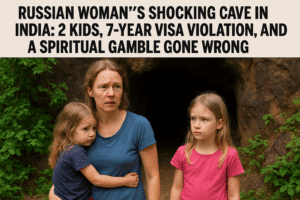Russian Woman’s Shocking Cave Rescue in India: 2 Kids, 7-Year Visa Violation, and a Spiritual Gamble Gone Wrong
A 40-year-old Russian woman, Nina Kutina, and her two young daughters were rescued from a remote, landslide-prone cave in Karnataka’s Gokarna after living there for two weeks in search of spiritual solitude. Authorities found them during a routine patrol and warned them of the dangers, including venomous snakes and unstable terrain. Kutina, who had traveled from Goa, claimed she sought meditation and escape from urban chaos. Further investigation revealed her expired business visa—originally valid until 2017—and an illegal overstay after re-entering India via Nepal in 2018.
The family was relocated to a local ashram, but Kutina now faces potential immigration consequences. The case highlights the risks of unchecked eco-spiritual tourism, visa compliance gaps, and child welfare concerns in extreme off-grid living. Officials stress the need for better awareness of India’s visa rules and environmental hazards for foreign visitors.

In a startling discovery, a 40-year-old Russian woman and her two young daughters were rescued from a precarious cave in Karnataka’s Gokarna, where they had been living in isolation for two weeks. The incident, which unfolded on July 9, highlights the dangers of unchecked spiritual pursuits and the complexities of visa overstays in India.
A Dangerous Refuge
Local police, during a routine patrol of Ramatirtha Hill—a landslide-prone area known for venomous wildlife—stumbled upon Nina Kutina and her daughters, aged 6 and 4, living in a makeshift shelter inside a cave. Kutina, who had traveled from Goa, told authorities she sought “spiritual solitude” away from urban chaos, meditating and praying in the forest.
However, the location was far from safe. Just a year prior, in July 2024, the same hill had witnessed a devastating landslide. Authorities warned Kutina of the risks, including snake bites and unstable terrain, before escorting the family to safety. At her request, they were relocated to an ashram in Bankikodla village, run by an 80-year-old female monk, Swami Yogaratna Saraswati.
Visa Violations Uncovered
During questioning, Kutina claimed her passport and visa documents were lost in the cave. A joint search by police and forest officials recovered the papers, revealing a troubling detail: Kutina had entered India on a business visa that expired in April 2017. An exit permit was issued in Goa in 2018, but she later traveled to Nepal and re-entered India in September 2018, overstaying illegally.
Broader Implications
This case raises questions about:
- Eco-Spiritual Tourism Risks: Foreign nationals increasingly seek remote Indian locations for meditation or “off-grid” living, often unaware of environmental dangers.
- Visa Oversight: Kutina’s prolonged overstay underscores gaps in tracking visa compliance, especially for those moving between regions.
- Child Welfare: Authorities noted the children appeared healthy but emphasized the hazards of raising them in such conditions.
What’s Next?
Kutina’s legal status is now under scrutiny. While she wasn’t charged immediately, her case has been forwarded to immigration officials. The ashram has offered temporary shelter, but her future in India remains uncertain.
Lessons Learned
This incident serves as a cautionary tale for spiritual seekers and highlights the need for better visitor education on India’s visa rules and ecological risks. For now, the Russian mother’s quest for peace has ended with an unexpected rescue—and a looming bureaucratic reckoning.
You must be logged in to post a comment.